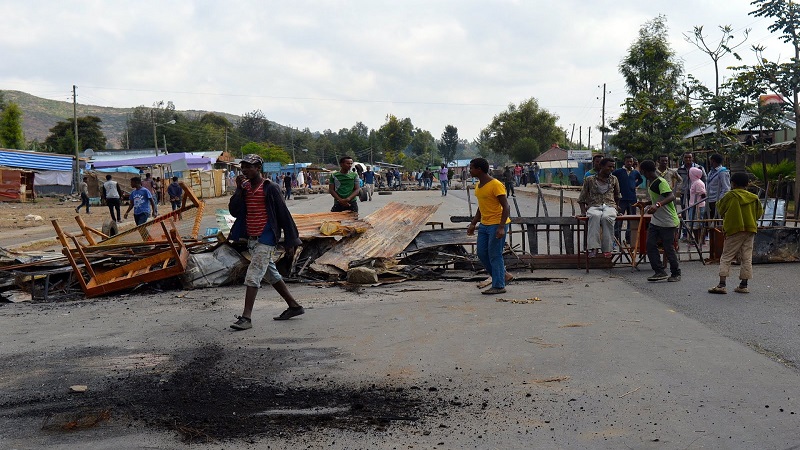In the early hours of Wednesday a Facebook post by the Office of Ethiopian Prime Minister Abiy Ahmed seemed to indicate that several months of growing tension between the federal government and the country’s northern Tigray regional state had reached a tipping point.
The Facebook post accused the Tigray People’s Liberation Front (TPLF) of an unprovoked attack on the Ethiopian army’s northern command of trying to loot its weapons. In response, the prime minister said he had ordered military operations against what it called “a treacherous” group.
The TPLF, meanwhile, has accused Abiy’s administration of trying to destroy Tigray’s right to self-determination and conspiring with Ethiopia’s northern neighbour Eritrea to stage a military attack.
On Thursday, Tigray regional president Debretsion Gebremichael said the region has gained control of all the heavy weaponry of the northern command and that the division’s leadership and rank and file had decided to side with Tigray, an allegation denied by the federal government.
Martin Plaut, a former BBC Africa editor and a longtime observer of politics in the Horn of Africa said despite long-standing tensions between the two sides, there were two main reasons why a conflict broke out this week.
“PM Abiy gradually eroded the system of ethnic federalism that the TPLF had built under PM Meles (who died in 2012),” Plaut told Al Jazeera. “This threatened their hold over the Tigray region. The TPLF resisted, holding elections on 9 September this year, despite PM Abiy banning this show of regional autonomy.
“Secondly, PM Abiy mended fences with Eritrea, Ethiopia’s northern neighbour which borders directly on Tigray. Eritrea’s President Isaias Afwerki has a long-standing animosity towards the TPLF. The Tigrayans were threatened with a pincer movement from south and north and have effectively seized control of their region.”
Although the TPLF governs Tigray it acts as an opposition party at the federal level, with Abiy’s Prosperity Party (PP), which was formed late in 2019 controlling the central government and the country’s nine remaining regional states.
With telephone and internet communications lines cut in Tigray, many Ethiopians and analysts are relying on media outlets owned by the federal government and the Tigray regional government as well as social media posts of partisan bloggers for information.
Tsedale Lemma, the founder and editor-in-chief of the Addis Standard, an English publication that reports on domestic and foreign current affairs, agrees politics is behind the escalation between the federal government and Tigray regional state but says the flare-up was precipitated by differences over military appointments.
“Fundamentally, the differences (that are) mostly political in nature have been building up since Abiy came to power,” she said. “However, it is safe to say the immediate reason follows the latest army restructuring announced by the Federal government and Tigray’s decision to reject the new appointments, including chief of command, for the Ethiopian Defense Force’s northern command.”
Kjetil Tronvoll, a professor of peace and conflict studies at Bjorknes College in Norway and a keen observer of Ethiopian politics for 30 years, says the establishment of PP from the ashes of the ruling coalition Ethiopian People’s Revolutionary Democratic Front (EPRDF) and TPLF’s refusal to enter a centralised party system had fed mutual animosity, on top of tensions that had been festering since Abiy came to power in April 2018.
This mutual animosity deepened when the PP-dominated federal legislature postponed national elections slated for last August citing the risks from COVID-19, while the Tigray regional administration, which opposed the move, held its own election in defiance of federal government warnings.
‘Civil war in the making?’
Although the scant information coming out of the “front lines” around Tigray suggest the military skirmishes have been limited, many Ethiopians are worried the country could be entering into a phase of destructive civil war reminiscent of the 1970s and 1980s.
Plaut, while not discounting this possibility, says a full-fledged civil war is not inevitable.
“This could be the start of a civil war, but that is not certain,” he said. “The situation in Tigray is one of many crises in the country, but could intensify, drawing in other Ethiopian regions, while also threatening neighbouring Sudan and Eritrea.”
While Lemma agrees a full-fledged civil war is not inevitable, she says it is a “real possibility” and one that could endanger the very territorial integrity of Ethiopia.
“To assert it could be the beginning of a civil war depends on whether or not both parties heed the growing international calls to de-escalate the current standoff and tension,” she said. “But I can say both have passed the phase of mutual brinkmanship – and that should worry us all.
“The possibility of Ethiopia breaking apart is real, but the final verdict depends on two critical outcomes of the current standoff: First, if the parties opt for a conventional war; and second, absent that, if they refused to conduct a serious dialogue and power bargain as a peaceful way out and continue maintaining a tense status quo.”
Tronvoll notes the crisis would be difficult to solve through military means.
“I don’t think any side can militarily annihilate the other side, it’s likely instead it could turn into an unnecessary protracted conflict which in the end would need to find a political solution,” he said.
While the federal government and TPLF seem to be inching towards war, with the world distracted by other events including the US presidential election, there are calls domestically and internationally for both sides to show restraint.
Amnesty International and Human Rights Watch have called on the Ethiopian federal government to restore communications in Tigray, while there are reports of behind-the-scenes diplomatic efforts to de-escalate the conflict.
For now, many Ethiopians regardless of their political motivation are looking on helplessly, fearful their country is drifting inexorably towards civil war.
Source: Al Jazeera






 WhatsApp us
WhatsApp us 

